Did I make it harder to sell your crappy, used crypto mining graphics card? Good
Opinion: The best time to stop crypto mining was 2009. The second best time is now.
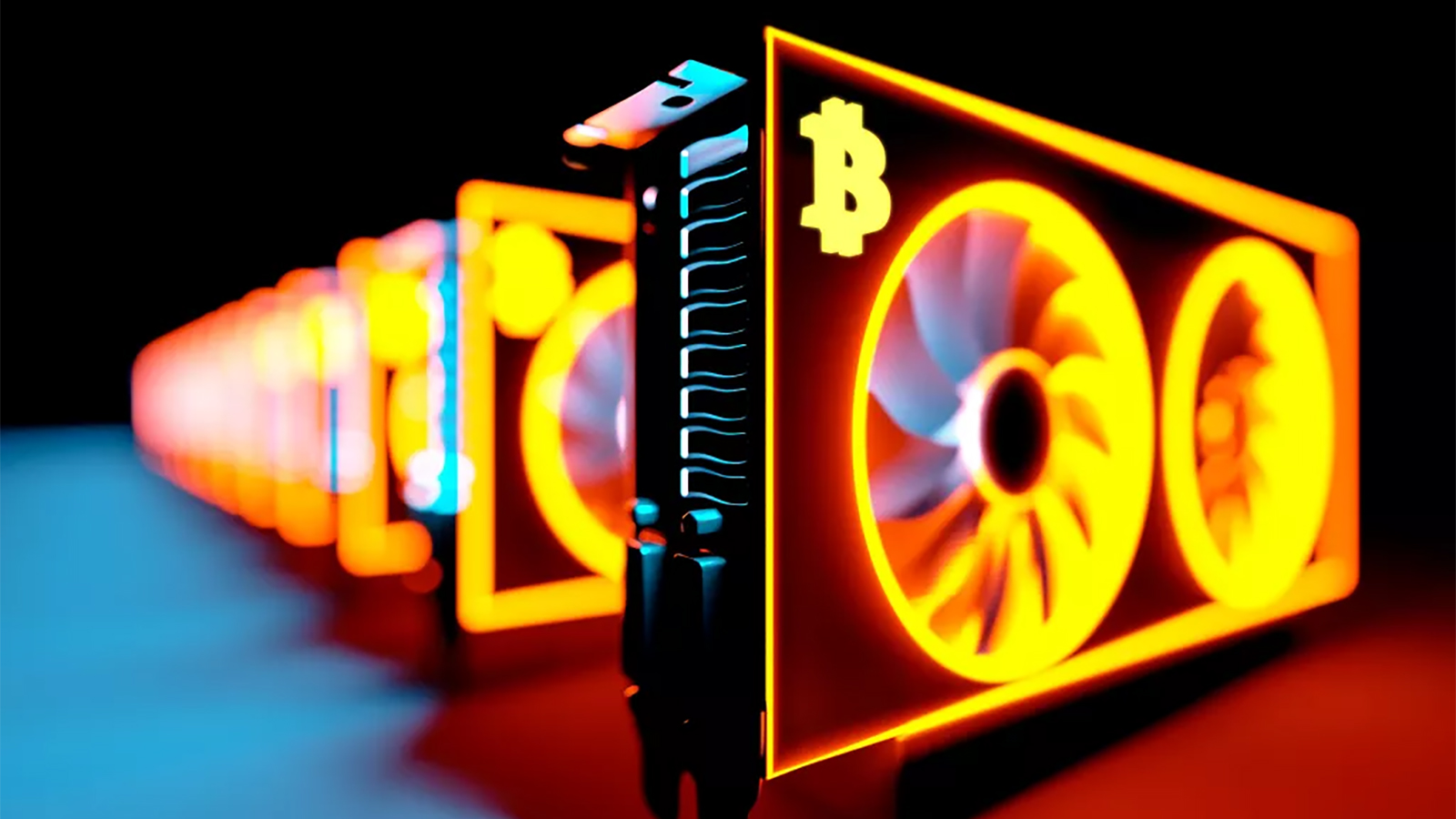
There are two things that are guaranteed to get you hate mail in this business: being a woman online with an opinion, and criticizing crypto.
The piece I wrote earlier this week dissuading readers from buying a used graphics card right now seems to have hit a nerve with many in the crypto community, and it was utterly predictable.
With crypto miners buying up all the best graphics cards to endlessly run ether hashing algorithms, there's been nary a GPU for the many gamers out there, even to the point that Nvidia was forced to implement new software and hardware tricks to try to limit the hash rate of their graphics cards to make more supply available to gamers who were left out in the cold. Even that effort was stymied by crypto miners hell-bent on easy money at the expense of the environment.
So now that the crypto bubble has popped and everyone is scrambling to sell the graphics cards they spent thousands of dollars on in an attempt to break even, some did not take kindly to my suggestion that the best possible outcome is that crypto miners get absolutely soaked.
Again, understandable, but as FDR once said, they are unanimous in their hate for me (according to my DMs and inbox), and I welcome their hatred.
I meant what I said
TechRadar is a consumer product site, and our focus here is to make sure that everything you buy is the best purchase for you. A used graphics card just isn't a good purchase right now. I said so, and I have no interest in making it easier for a lot of shady crypto miners to sell their worn-out GPUs by holding my tongue on this.
My interest is our entire readership, and given current inflation and cost-of-living issues, a lot of readers might be tempted to buy a used RTX 3080. I advised them that they might be buying a lemon and that there's no way to tell a good card from a bad one.
Sign up for breaking news, reviews, opinion, top tech deals, and more.
[I]n the next bull run, I'll sell all these cheap cards your [sic] telling everyone not to buy for triple what I bought them for. Because once again cards will be impossible to find. See your [sic] not really helping anyone. Your shortsightedness well [sic] be my gain.
An entrepreneurial spirit
Given the nature of the crypto space, there are a lot of ne'er-do-wells out there who will happily sell someone a card on its last leg while wrapping it up like it's brand new. Six months to a year from now when the card craps out, the seller will be long gone and there's no getting that money back. That reader is out serious money and now they have to buy another card.
Sorry, my interest is in helping that reader not get screwed, and I will not apologize for that.
As for all of your "criticisms", let's go over some of the highlights.
Is it okay to buy a used GPU?
So this is the number one complaint I've been getting about the piece I wrote, and I'll address this one right up front.
Buying used isn't a bad idea in the least bit – normally – but right now it's a risky purchase. In any second-hand market, there is going to be some percentage of lemons/defective items in the mix with perfectly good and reasonably priced products and equipment.
This goes for everything from a used MacBook to a used car. Graphics cards are no different, and normally it would just be a matter of doing proper research and buying from reputable sources, particularly if a card is refurbished and comes with some kind of additional commercial guarantee from the seller.
But these are not normal times. The market is currently being inundated with graphics cards whose quality is unknowable with no way to really assess whether the price you're paying is a fair price. There's also a lot of competition right now among sellers – moreso than normal – to get you to buy their card over someone else's, so they have every incentive to lie to you or obfuscate the condition of the graphics card so that you'll buy it.
If you can't afford to buy a card in new condition, buying a used one is a totally legitimate way to get the equipment you need. I'd even say look into buying a used GPU later this year once people start upgrading to next-gen cards and want to recoup some cost on a two-year-old RTX 3070.
But buying right now? I wouldn't, and I wouldn't recommend anyone else do so either.
Your article is literally nothing but an angry rant and you fail to provide a single factual explanation as to how these "GPUs are trashed" no sources to back anything up at all.
An inquisitive sort who wants to learn
You simply can't tell the amount of internal wear on these cards and you don't know how much useful life they have left in them. There are no odometers.
There's a higher than normal chance that you're going to spend a lot of money on a card that won't last nearly as long as you expect given the price you're paying for it. Ultimately, you may end up spending a lot more money in the long run, maybe even more than if you just bought a new, more expensive card.
Yes, you CAN burn out a graphics card with cryptomining
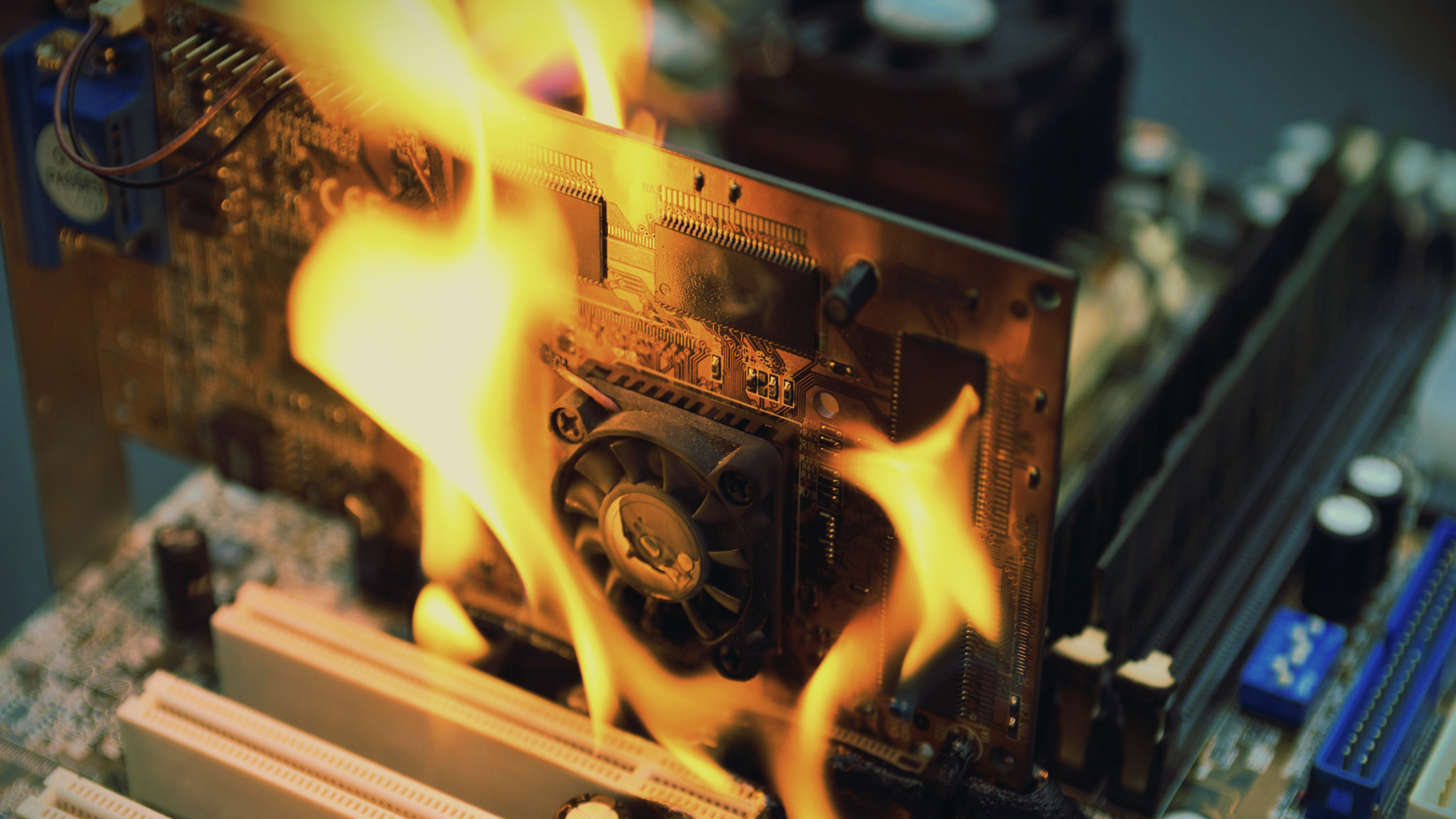
One thing several cryptocomplainers have messaged me is to argue that crypto mining has been proven – proven! – to not damage a graphics card.
Poppycock.
I've spent years studying computer science, including computer architecture, and GPUs aren't made of pixie dust and rainbows, they're made of physical silicon, with lithographed transistors and other nanoscopic components whose widths are measurable in numbers of atoms.
An electrical current passing through that silicon gradually change the character and physical structures of these components. It wears them down and, eventually, they fail. As transistors get smaller and smaller, these sometimes-quantum-level effects matter more and more as the transistors are that much more sensitive owing to their size.
Don't believe me? Here's an IEEE report on the effects of electrical current on the breakdown of silicon nanostructures.
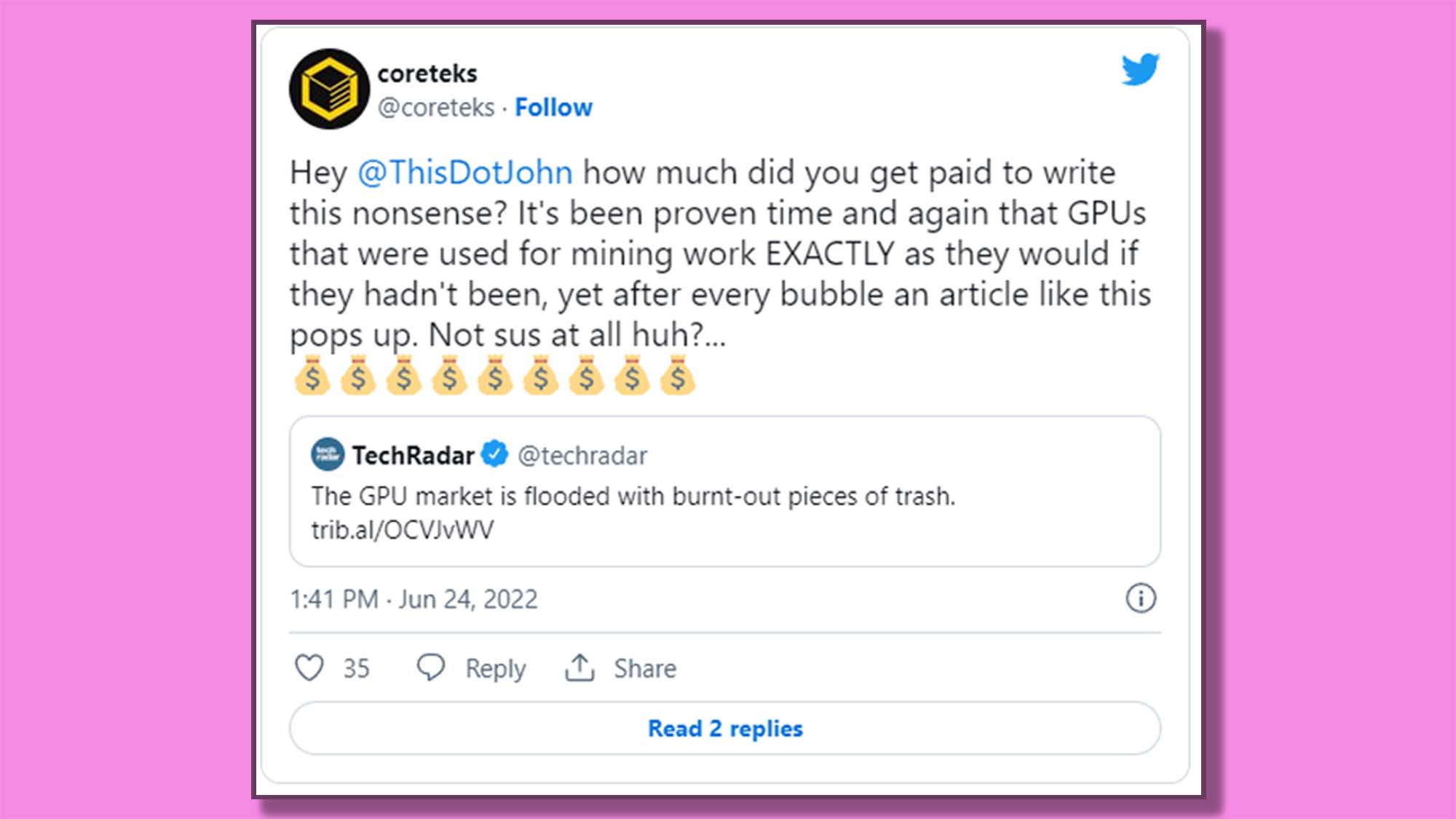
Since crypto miners want Hard Evidence of this phenomenon, here's a peer-reviewed article called "Asymmetric aging effect on modern microprocessors" from the engineering journal Microelectronics Reliability that you can read to gain some insight into how electronics break down over time with use.
Or, you can Google "transistor aging" and read any number of dozens of engineering papers on the topic.
For all those out there claiming that graphics cards should last more than a decade, the automotive and healthcare industries have the most stringent reliability demands of any microprocessor consumer, and their chips are rated for 10 to 15 years of reliable service before they start to fail. Graphics cards are nowhere near that level.
It is simply the case that the more and/or the longer electrical current passes through a transistor, the quicker it fails. This is basic electrical engineering. This isn't shilling for graphics card makers, it's just reality.
Graphics cards aren't singularities freed from the constraints of chemistry and physics. Any claim that constant crypto mining doesn't wear out a graphics card over time is either spoken out of ignorance or duplicity.
Yep, gamers abuse graphics cards too, sometimes even worse than miners, but that's irrelevant
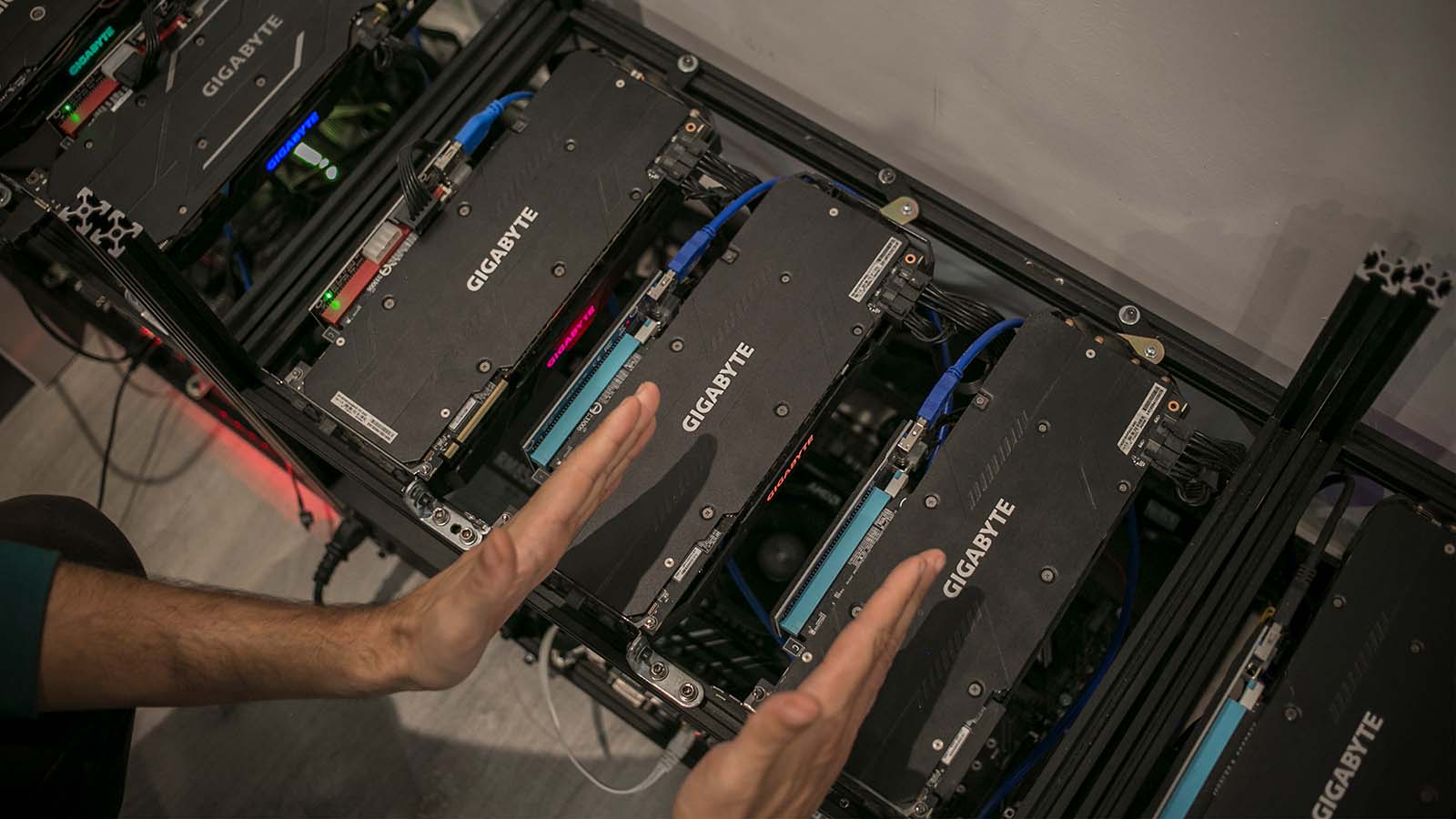
Now what about the claim that gaming wears out graphics cards faster than mining does? That's perfectly arguable and there is data to support that prolonged, intense gaming introduces greater heat stresses into the silicon and other components that reduce the card's life.
If tens of thousands of wannabe hardcore PC gamers bought up all the graphics cards, abused the hell out of them, and then tried to sell them on the second-hand market for any significant fraction of MSRP, I'd be sending gamers into a rage this week instead of miners by telling readers that they can't trust those cards either and so maybe now is not the best time to buy a used card.
[I] just want to say thanks for ... calling out crypto miners and what they have done to the environment, gaming industry, and – though while not brought up by you – professionals in engineering, 3D modeling, AI Research, etc who HAD to cough up those crazy prices just to do their job. Keep up the good work!
A legitimate graphics card user
But the market isn't being flooded with graphics cards from gamers whose PC maintenance practices are entirely unknown, so the kind of damage gamers are doing to their cards is, at best, tangentially relevant to this conversation.
No, we're dealing with a glut of mining cards right now, many of them coming from mining farms where they've been locked up in a warehouse with hundreds of other cards grinding out ether for over a year. Do some warehouses have proper AC, ventilation, and maintanence? Sure. Do all of them? No. Is the card you are buying coming from the former warehouse or the latter? Have you checked? Is it even possible to check?
Miners swear that they take better care of their cards than gamers. I'm sure a lot of miners do, but are you negotiating with that kind of miner when you buy that used graphics card? Or, are you buying from a miner who is desperate to break even on a crappy investment, who doesn't know what they are doing, and has been running their cards in an enclosed box with no ventilation and no cleaning for a year and a half at full voltage?
The crypto bubble just burst. Who do you think is out there right now selling their used mining cards that they totally swear are totally fine and are absolutely worth a significant fraction of a new card's MSRP?
But Linus Tech Tips, alsd;ljfhsda;ljfhs! BLARGH!
You need to talk to [Linus Tech Tips] and get the real truth on used v cards from miners as they take better care of ther [sic] cards better than a gamer the under vote [sic] the cards and all so be for you spout off that used cards are not worth buying Kinda makes me think u was paid buy [sic] nvidia to say such dumb [expletive].
A kind-hearted reader
"Oh, oh, but Linus Tech Tips proves that mining doesn't degrade graphics card performance so you're just an Nvidia shill!"
First, I never claimed that "mining degrades performance" (you can reread the original piece to check if you like, I'll wait), and, second, watch the whole video.
The cards Linus Tech Tips tests came from a miner who – assuming these cards were actually used to mine as claimed – took exceptionally good care of their cards.
He even points out that if the card's cooler is clogged up and dirty, then the entire performance demo he just showed goes out the window and you absolutely can get performance degradation of 10% or more (starting around the 8:20 mark), which goes beyond even what I have been saying.
Before you say "Well just clean the coolers and repaste! Duh!" I'm more interested in the damage done to the card from all that dust and poor maintenance, which is again something that is easy to disguise when purchasing a used card, and how much that damage has reduced the useful life of that card. I don't care about performance, I care about whether our readers are paying too high a price for cards thinking they'll last three years only to find they last for two or even one. I care about how long until that card stops working, period.
Finally, he says that, in his opinion, if you find a card for half the price with like-new performance, "YOLO it" and buy another card if the first one dies. My point was and still is that you cannot know how long that card will continue to operate before it simply stops working – what he calls the "binary" condition of the card.
It's not even that far into the video, people. Cards crapping out on you is first discussed at the 2:15 mark and it's mentioned several times throughout. Fast forward to 9:04 and watch where he says the "remaining lifespan of the GPU before it reaches that binary, doesn't-work state could be a major concern as well" when judging whether to buy a used card at any given price.
The only disagreement I have with this video is that most people simply cannot YOLO a $300 graphics card, much less a $600 one, but this video was made in 2021 before we got hit with a global inflation/cost of living crisis so I'll give them a pass on that point.
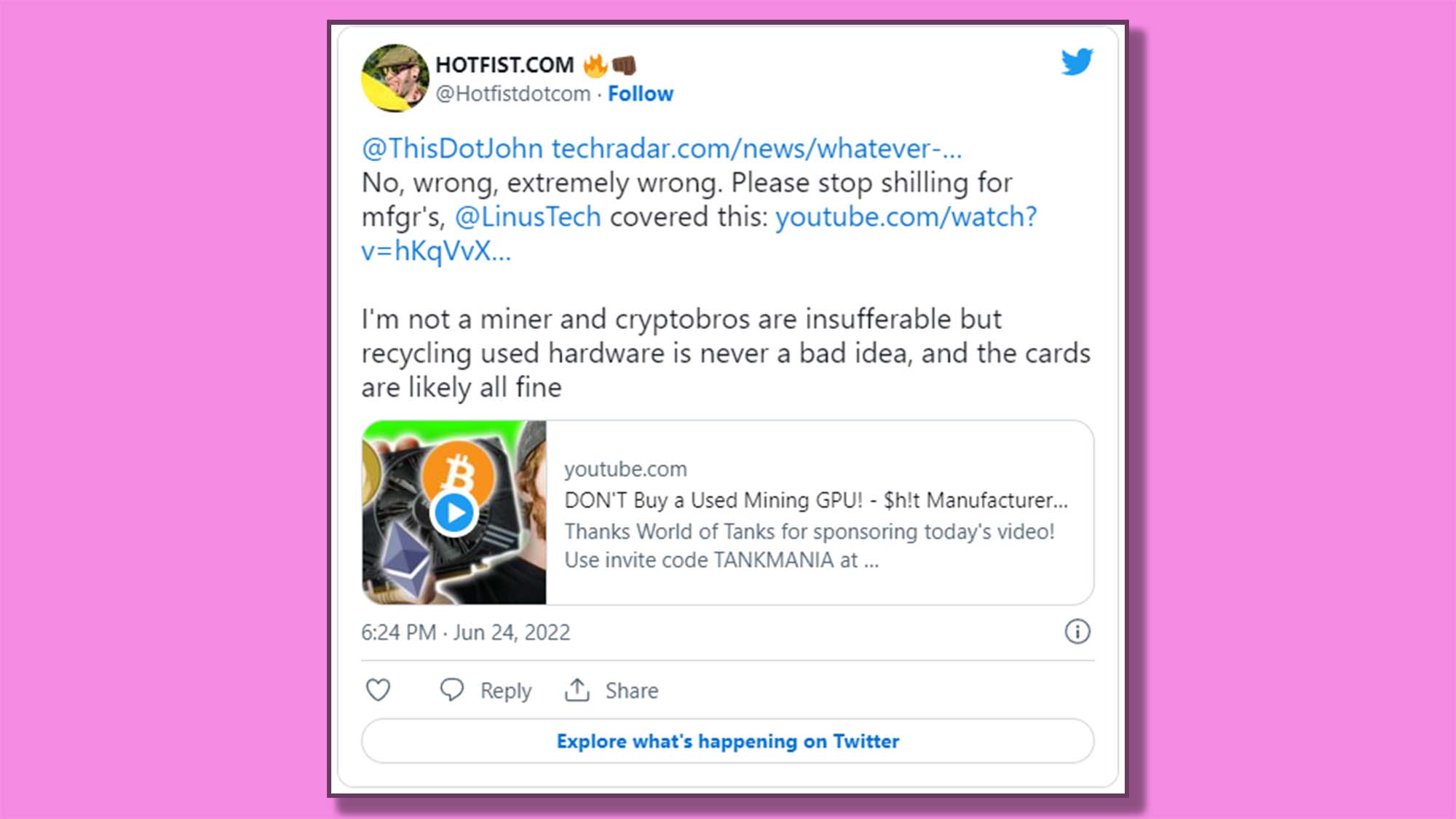
As it stands, our readers might only have enough money for one graphics card purchase and that card needs to last them years. We want them to get the best graphics card for their money. I do not care if it's from AMD vs Nvidia, or whether it's from Asus, Palit, Galax, Gigabyte, whatever. I don't care if it's used, I don't care if it's new. I only care that our readers don't get screwed, and there are a lot of shady miners selling graphics cards on the second-hand market right now.
If you pay half price for a used RTX 3090, how do you know that you will get half the usable life out of it when you buy it? If it last 5-6+ years, you struck gold. If it lasts a year, you just got screwed. You'll never know until it dies, and by that point, good luck getting your money back. Caveat emptor, suckers.
This is exactly what I am warning against, so to my many new crypto friends out there who barely read or didn't read my piece at all, go back and reread what I actually said. And please, please, please, check the sources you cite that "prove" that I'm an Nvidia shill before sending them to me like you're hitting me with a Draw Four in Uno.
We've already lost one generation of graphics cards to crypto, let's make it the last
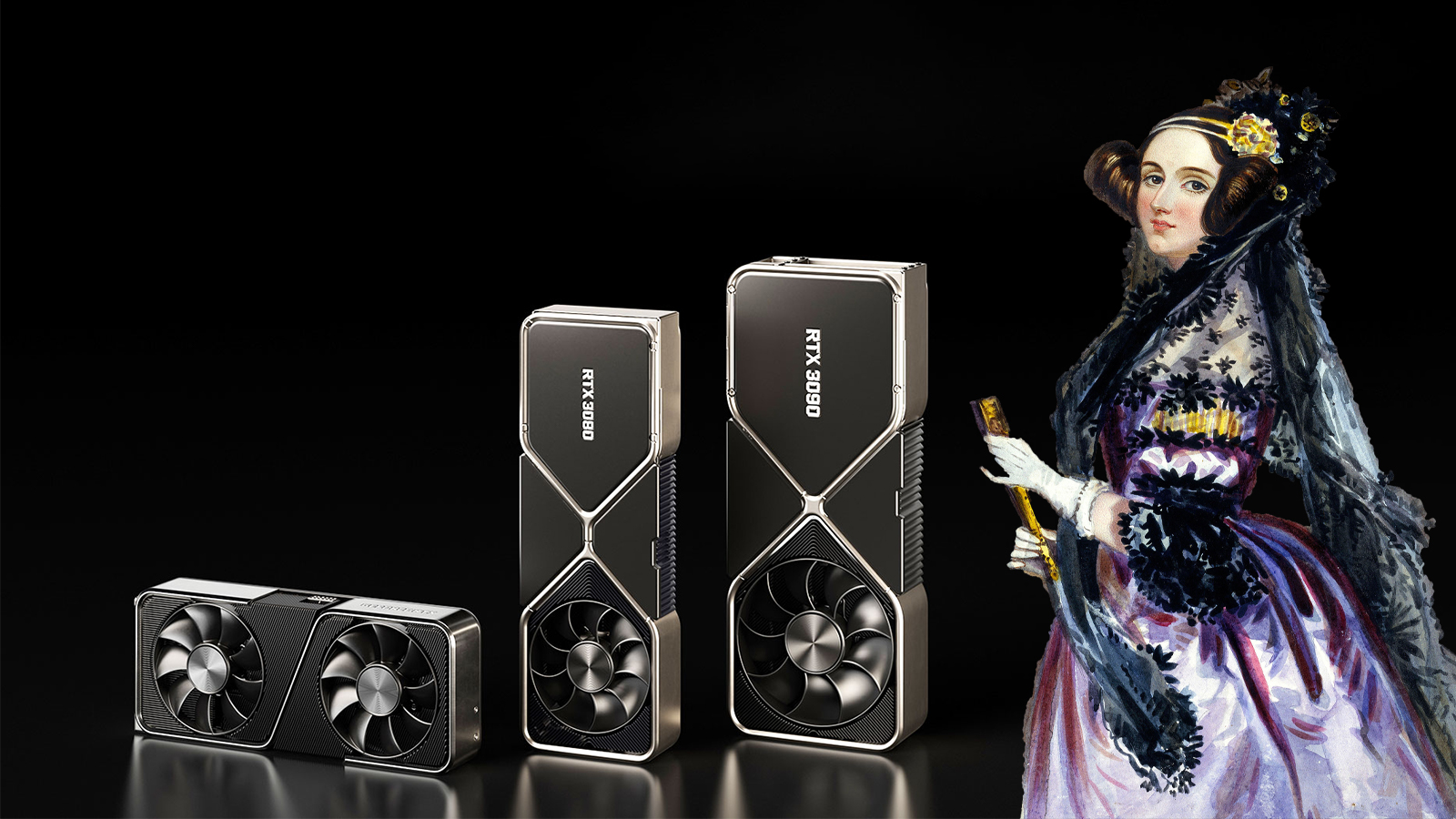
It's been nearly two years since the release of the RTX 3080, and outside of those who bought some of the best gaming PCs with preinstalled RTX cards and tech journalists who have labs with review units on the shelves, no one I know has been able to get their hands on one of these cards – and not for lack of trying.
The entire Nvidia Ampere lineup has more or less passed right over the heads of gamers everywhere, not to mention researchers who use GPUs to cure cancer and the like. This has engendering a lot of bitterness and disappointment for far, far more of our readership than a couple of dozen crypto miners who have messaged or emailed me to complain that I'm being harsh.
I've heard from parents trying to upgrade their kids' gaming PC with even the best cheap graphics cards like the RTX 2060 who have been completely unable to do so. I've heard from people who saved up for months to buy an RTX 3080 to finally upgrade their gaming rigs only to have their purchases get bought out from under them because they can't make an online purchase quicker than a scalper's bot.
You're a useless hack that writes fake news idiot look at all the actual tech bloggers that tested mining cards and proved they work at 95% efficiency.
A devoted fan
I've spoken to gamers who spent an entire night on line outside of a Manhattan Best Buy hoping to get a graphics card that they could barely afford only to get pushed out of the way by line-cutters who were only there to buy the card so they could resell it on eBay to a crypto miner for twice the MSRP.
Crypto miners have spent as much as $15 billion on GPUs during the crypto bubble and all the "wealth" they generated has been almost completely erased from the market because fake internet money is still fake internet money at the end of the day.
The entire exercise was pointless except for the few who rode the bubble on the way up and got off at the top, essentially sucking up the bank balances from the latecomers who bought in at the top and have now lost everything on the way down.
No value has been created unless you value a warmer, more inhospitable planet, and those miners who are deep in the red are desperate to make good on the gimmick they literally bought into with actual, real, pay-the-rent money.
The right path forward
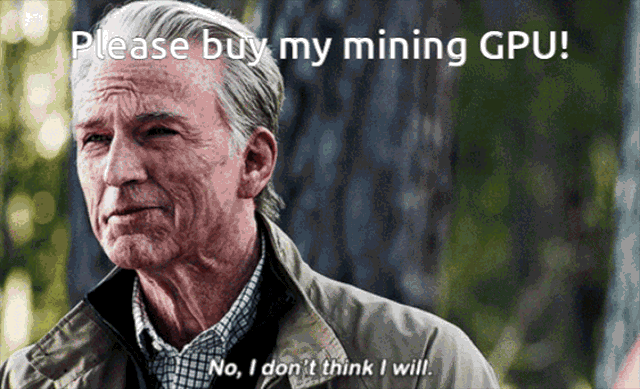
I have had a gpu that was mining for 4 years in my main system for more than a year and it is working flawlessly. It has been proved that crypto mining does not destroy gpus, and it upset me that you said we need to pay.
A heartbroken miner
Later this year, Nvidia Lovelace and AMD RDNA 3 are expected to launch. If the gods are generous, crypto will stay in the crater it's currently in and the next generation of graphics cards will be much more available and cheaper than the last.
And before you message me about Proof-of-Stake and Ethereum, if it's not ether, it will just be some other dumbass meme coin or NFT project that needs a high hash rate, so miss me with that.
One way to help all this along is to disincentivize crypto miners from even thinking about buying a Lovelace or RDNA 3 card for mining purposes later this year. The best way to do that is to not bail them out now that crypto has crashed and mining isn't profitable.
They have "perfect" graphics cards as it is, so let them use those cards then. If crypto is "the Future," then those cards should be perfectly serviceable for their needs once crypto recovers, so why are they so eager to sell them?
C'est un mystère, non?
First of all I'm not a miner. Secondly your writing is very amateur in quality. Your opinion is trash. If writing is your day job I'd suggest going back to school... it's not for you
Definitely a miner
Or, maybe, a lot of miners need to sell these graphics cards in order to either break even or make a profit because they recognize that crypto is a scam and might never recover and they're left holding a bag that they would really rather not be holding.
Which do you think is more likely?
For two years, nothing about this entire graphics card market has been in gamers' control, but finally this one thing is.
You don't have to make whole the crypto miners who mocked you on Twitter when you complained about not being able to buy a new graphics card. All those miners who showed off their stacks of RTX boxes with hashtags like #ToTheMoon, #Crypto, #DealWithIt, and have $ETH in their bios? Well a lot of them now need you to make this whole thing worthwhile for them.
Enjoy this moment, fellow gamers. Treat these used up graphics cards like they were EA Lootboxes and slam the door in their faces. Maybe miners will learn that crypto mining just doesn't pay and they give it up for good.
Not only will refusing to buy these cards now help restore the graphics card market to sanity going forward, it'll also give us a better shot at averting the worse effects of the climate crisis if we can convince more people to give up on crypto mining or never take it up in the first place.
As far as I can see, it's all upside. The choice is ours.

John (He/Him) is the Components Editor here at TechRadar and he is also a programmer, gamer, activist, and Brooklyn College alum currently living in Brooklyn, NY.
Named by the CTA as a CES 2020 Media Trailblazer for his science and technology reporting, John specializes in all areas of computer science, including industry news, hardware reviews, PC gaming, as well as general science writing and the social impact of the tech industry.
You can find him online on Bluesky @johnloeffler.bsky.social